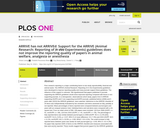
Poor research reporting is a major contributing factor to low study reproducibility, financial and animal waste. The ARRIVE (Animal Research: Reporting of In Vivo Experiments) guidelines were developed to improve reporting quality and many journals support these guidelines. The influence of this support is unknown. We hypothesized that papers published in journals supporting the ARRIVE guidelines would show improved reporting compared with those in non-supporting journals. In a retrospective, observational cohort study, papers from 5 ARRIVE supporting (SUPP) and 2 non-supporting (nonSUPP) journals, published before (2009) and 5 years after (2015) the ARRIVE guidelines, were selected. Adherence to the ARRIVE checklist of 20 items was independently evaluated by two reviewers and items assessed as fully, partially or not reported. Mean percentages of items reported were compared between journal types and years with an unequal variance t-test. Individual items and sub-items were compared with a chi-square test. From an initial cohort of 956, 236 papers were included: 120 from 2009 (SUPP; n = 52, nonSUPP; n = 68), 116 from 2015 (SUPP; n = 61, nonSUPP; n = 55). The percentage of fully reported items was similar between journal types in 2009 (SUPP: 55.3 ± 11.5% [SD]; nonSUPP: 51.8 ± 9.0%; p = 0.07, 95% CI of mean difference -0.3–7.3%) and 2015 (SUPP: 60.5 ± 11.2%; nonSUPP; 60.2 ± 10.0%; p = 0.89, 95%CI -3.6–4.2%). The small increase in fully reported items between years was similar for both journal types (p = 0.09, 95% CI -0.5–4.3%). No paper fully reported 100% of items on the ARRIVE checklist and measures associated with bias were poorly reported. These results suggest that journal support for the ARRIVE guidelines has not resulted in a meaningful improvement in reporting quality, contributing to ongoing waste in animal research.
- Subject:
- Applied Science
- Health, Medicine and Nursing
- Life Science
- Material Type:
- Reading
- Provider:
- PLOS ONE
- Author:
- Daniel S. J. Pang
- Frédérik Rousseau-Blass
- Guy Beauchamp
- Vivian Leung
- Date Added:
- 08/07/2020
